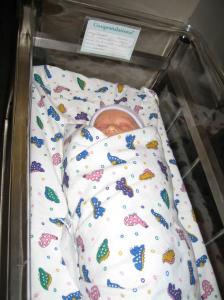Guidelines for Early Rehabilitation and Nutrition for Infants at Risk of Neurological Issues
Researchers develop strategies for early intervention and nutrition in infants at high risk of neurological impairment
BEIJING, CHINA, June 19, 2024 /EINPresswire.com/ -- A wide range of risk factors such as in-utero, perinatal, or postnatal can cause neurological impairment in infants. Early diagnosis and management of infants at high risk of neurological impairment (IHRNI) is vital to prevent permanent neurological complications. A team of specialists and experts have evaluated clinical research findings and developed recommendations to guide the early rehabilitation and nutritional management of IHRNI, aiming to improve their developmental outcomes and overall quality of life.Newborns can be affected by neurological complications and disorders affecting the brain, spinal cord, and neuromuscular system. A wide range of risk factors such as in-utero, perinatal, or postnatal can cause neurological impairment in infants. Early diagnosis and management of infants at high risk of neurological impairment (IHRNI) is vital to prevent or reduce serious and permanent neurological conditions. Moreover, IHRNI can be vulnerable to malnutrition which impacts their neurological development and quality-of-life.
Currently, there is a dearth of clinical recommendations and guidance for the early rehabilitation and nutritional management of IHRNI. To address the lack of effective guidelines and recommendations, the Rehabilitation Group of the Pediatrics Society of the Chinese Medical Association and a team of 62 specialists from China, USA, UK, and Belgium have developed a consensus focusing on 10 key clinical issues in the early rehabilitation and nutritional management of IHRNI. Their study was published online in Pediatric Investigation journal on May 26 2024. Sharing the motivation behind the research work, Dr. Kaishou Xu, from the Department of Rehabilitation, Guangzhou Women and Children’s Medical Center, Guangzhou Medical University, China says, “Early intervention should be initiated when professionals identify neurological impairment-related clinical symptoms. In addition, IHRNI might be susceptible to undernutrition, which not only impedes their neurodevelopment but also reduces their quality of life”.
Initially, the team of researchers conducted a comprehensive literature review to identify key research findings and evidences related to neurological disorders in infants. Subsequently, they analyzed the selected literature and evaluated their clinical significance to consolidate and develop the final recommendations. The clinical recommendations covered the key aspects affecting IHRNI like early detection of IHRNI, factors affecting IHRNI prognosis, need for early rehabilitation, and nutritional management in IHRNI.
The expert panel of specialists stress on the early identification of clinical symptoms related to neurological impairment in IHRNI that can guide intervention strategies. Neurological and developmental assessments along with magnetic resonance imaging (MRI) of the brain can aid in the early detection of IHRNI. “Early rehabilitation might promote the development of motor and cognitive skills in IHRNI. It could effectively alleviate the severity of cerebral palsy, and reduce or prevent secondary complications associated with cerebral palsy”, says Dr. Nong Xiao, highlighting the effectiveness of early rehabilitation in enhancing functional outcomes for IHRNI.
Furthermore, the clinical recommendations emphasize the importance of active involvement of the family members that can help in the development of cognitive, behavioral, and motor skills. Early interventions such as cognitive therapy, developmental care in neonatal intensive care unit (NICU), feeding support, and task-specified motor training may prove to be effective in improving the outcomes of IHRNI.
Beyond early rehabilitation, expert guidance emphasizes the importance of nutritional management in improving the overall health of infants at high risk of neurological impairment (IHRNI). Nutritional management not only enhances overall health but also helps identify infants at risk of undernutrition. Careful consideration of their specific nutritional needs and providing adequate feeding and swallowing support can significantly benefit individuals with IHRNI.
Sharing the optimal strategy to promote early rehabilitation and nutritional support for managing IHRNI, Dr. Xu says, “A comprehensive approach involving an interprofessional medical team—including specialists in rehabilitation, pediatrics, neonatology, neurology, neurosurgery, gastroenterology, and nutrition—is essential”.
Regular and timely monitoring of motor and cognitive development, early interventions, and appropriate nutritional management can significantly improve outcomes and quality-of-life for IHRNI.
***
Reference
Titles of original papers: International consensus on early rehabilitation and nutritional
management for infants at high risk of neurological impairments
Journal: Pediatric Investigation
DOI: https://doi.org/10.1002/ped4.12426
Lu Lu
Pediatric Investigation
+86 10 6601 9629
lulu@pediatricinvestigation.org
Visit us on social media:
X
Legal Disclaimer:
EIN Presswire provides this news content "as is" without warranty of any kind. We do not accept any responsibility or liability for the accuracy, content, images, videos, licenses, completeness, legality, or reliability of the information contained in this article. If you have any complaints or copyright issues related to this article, kindly contact the author above.

